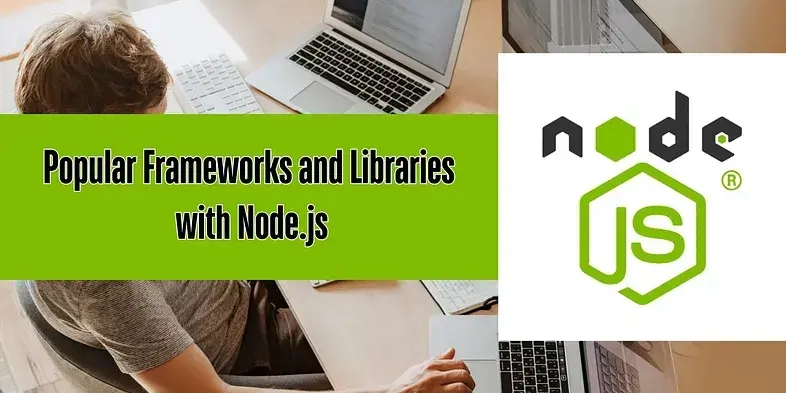
Supercharge Your Node.js Development: Top Frameworks and Libraries for 2024
Node.js empowers developers to build scalable and efficient web applications. But to truly maximize productivity and create robust systems, understanding the ecosystem of Node.js frameworks and libraries is crucial. Whether you're building a small API or a complex enterprise application, the right tools can make all the difference.
Why Use Frameworks and Libraries in Your Node.js Projects?
Building everything from scratch is time-consuming. Node.js frameworks provide structure, best practices, and reusable components, while Node.js libraries offer specialized tools for tasks like database management or API interactions. This combination saves time, minimizes bugs, and allows developers to focus on core features.
Top Node.js Frameworks to Accelerate Your Workflow
Selecting the correct framework forms a crucial decision point for your back-end development effort. Here are some of the best Node.js frameworks for consideration:
1. Express.js: The Flexible Foundation for Node.js Apps
Express.js remains the most popular framework, thanks to its simplicity and flexibility. This minimalistic, unopinionated framework provides a robust feature set for building APIs and web applications.
- Benefits:
- Lightweight and easy to learn, ideal for both beginners and experienced developers.
- Extensive middleware support for handling authentication, requests, and more.
- A massive community and ecosystem with countless plugins and resources.
- Use Case:
- Rapid development of APIs, microservices, or full-stack applications using React or Vue.
2. NestJS: Building Scalable Node.js Applications with Structure
NestJS is a progressive framework built with TypeScript, perfect for creating scalable and maintainable server-side applications. It combines object-oriented, functional, and reactive programming paradigms.
- Benefits:
- Built with TypeScript, offering strong typing and improved tooling support.
- Modular architecture promotes code organization in large projects.
- Supports dependency injection, improving testability and maintainability.
- Use Case:
- Enterprise applications, complex backends, or any project needing a structured approach.
3. Fastify: The High-Performance Node.js Framework
Fastify is designed for speed and low overhead, making it ideal for handling large volumes of requests while minimizing resource usage.
- Benefits:
- One of the fastest Node.js frameworks.
- Built-in JSON schema validation simplifies API development.
- Extensible plugin system enabling the addition of custom features.
- Use Case:
- High-traffic APIs, real-time applications, or performance-critical systems benefit most from using Fastify.
4. Koa: A Modern and Lightweight Alternative for Node.js
Koa leverages modern JavaScript features like async/await to simplify middleware handling. It's often considered a successor to Express.
- Benefits:
- Clean middleware system using async functions reduces callback complexity.
- Minimal core encourages developers to add only necessary components.
- Use Case:
- Developers seeking a lightweight, modern alternative to Express for building APIs or web applications will find Koa the perfect fit.
Must-Have Node.js Libraries for Enhanced Functionality
Frameworks establish the groundwork, while libraries provide specific tools for specialized tasks. Enhance the functionality of your Node apps with these libraries:
1. Mongoose: Simplifying MongoDB Interactions in Node.js
Mongoose is an Object Data Modeling (ODM) library for MongoDB, streamlining database interactions in Node.js applications.
- Benefits:
- Provides a schema-based approach to model data and ensure consistency.
- Simplifies complex MongoDB queries with an intuitive API.
- Use Case:
- Essential for any project using MongoDB, particularly MEAN or MERN stack applications.
2. Prisma: The Modern ORM for Node.js with Type Safety
Prisma is a modern ORM (Object-Relational Mapping) tool that supports multiple databases like PostgreSQL, MySQL, and SQLite. It is known for its type-safe queries and developer-friendly API.
- Benefits:
- Type-safe database queries with excellent TypeScript integration.
- Intuitive query builder that reduces boilerplate code.
- Use Case:
- Excellent for projects needing a robust database layer, especially when working with relational databases.
3. Axios: Your Go-To HTTP Client for Node.js
Axios is a promise-based HTTP client for making API requests from Node.js or the browser.
- Benefits:
- Simplifies HTTP requests using a clean, promise-based API.
- Supports request and response interceptors for intricate scenarios.
- Use Case:
- Perfect for integrating third-party APIs, fetching data, or building microservices.
4. Socket.IO: Enabling Real-Time Communication in Node.js
Socket.IO facilitates real-time, bidirectional communication between clients and servers using WebSockets.
- Benefits:
- Simplifies WebSocket implementation for real-time features.
- Supports fallback mechanisms for older browsers.
- Use Case:
- Essential for building real-time applications like chat systems, gaming servers, or live dashboards.
Choosing the Right Node.js Tools for Your Project
With so many available options, selecting the proper framework or library can prove challenging. Use the long-tail keyword Node.js project alongside these quick tips for guidance:
- For Speed and Simplicity: Choose Express or Koa for rapid prototyping or lighter Node.js project.
- For Scalability and Structure: Opt for NestJS or Fastify for larger, maintainable Node.js project.
- For Database Interactions: Use Mongoose for MongoDB or Prisma for SQL databases in your Node.js project.
- For Real-Time Features: Implement Socket.IO for WebSocket-based applications for your Node.js project.
- For API Requests: Utilize Axios for reliable HTTP client functionalities.
Consider your project's size, complexity, and your team’s expertise. Many of these tools can be used together – for example, Express with Mongoose and Socket.IO can create a powerful stack. Select wisely, and optimize your development process.